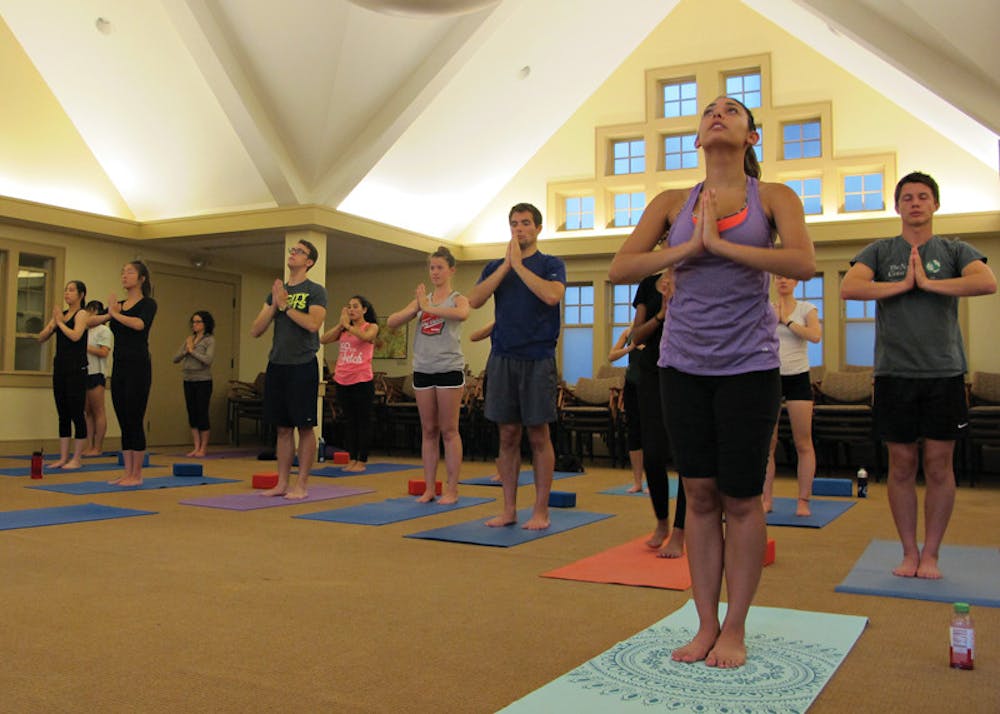Practices of mindfulness, such as meditation, may affect more than just the mind. According to a recent study conducted by University researchers, these activities may also potentially benefit cardiovascular health.
Headed by Eric Loucks, assistant professor of epidemiology, the research team measured cardiovascular risk factors and levels of mindfulness among 382 middle-aged people in 2010 as part of the wider New England Family Study. They found a significant correlation between mindfulness and four of the seven risk factors, as well as a positive relationship with physical activity and a negative one with smoking, BMI and fasting glucose.
Mindfulness is defined as a person’s awareness of his or her mental and physical states — one’s thoughts, emotions and needs. Loucks said he hypothesized that higher levels of self-awareness might help people make better decisions regarding their health — for example, by ignoring that craving for a doughnut or cigarette.
“People who are more aware of their own emotions and body’s sensations are going to make better choices, or choices that are more aligned with their own values or goals. They won’t be engaged in eating high-fat foods or smoking,” said Willoughby Britton, an assistant professor of psychiatry and human behavior who was also involved in the study.
The correlation was not as strong for the three other risk factors: blood pressure level, cholesterol and consumption of fruits and vegetables. Loucks said this may be because people do not necessarily feel the effects of high levels of blood pressure or cholesterol, whereas the other four factors have tangible effects on the body that people may feel on a daily basis.
The results, reported in the October issue of the International Journal of Behavioral Medicine, have positive implications for cardiovascular health, since mindfulness can be enhanced with practice, Loucks said. There are many avenues for mindfulness training available, as well as other ways to improve mindfulness, like yoga or meditation groups, he added.
In the study, participants completed the Mindful Attention Awareness Scale, a 15-question survey including statements like: “I find it difficult to stay focused on what’s happening in the present.” Participants rated the statements on a six-point scale from “almost always” to “almost never,” according to a University press release.
The scale is one of the best measures of mindfulness available, Loucks said. “People who meditate score higher on the scale, as well as monks. But we still need to take these findings with a grain of salt,” he said. “It’s a tool in a still-developing field.”
“Some studies on these mindfulness surveys have questioned whether the component being assessed really does relate to the type of mindfulness that people can develop with practice,” said Catherine Kerr, assistant professor of family medicine who was not involved in the study. Kerr also studies the relationship between meditation and health. “The jury is still out on how robust these questionnaires are in really capturing the ingredients of mindfulness as it unfolds and as people become regular mindfulness meditators,” she added.
But Loucks said he plans on conducting an experiment in the spring that would not depend on the scale. In this study, participants will undergo intensive mindfulness training and then have their cardiovascular risk factors tested. If mindfulness really does lower risk for cardiovascular disease, the training should have a significant effect on these factors, he said.
Kerr said she believes this research should also be incorporated into other larger epidemiological studies.“This represents the mainstreaming of mindfulness — it’s no longer simply about a small group of people who do mindfulness practice. This trait may have important implications far beyond that contemplative context.”
Several of the researchers said they practice mindfulness activities themselves. Loucks said he regularly practices meditation and that it has had a measurable impact on his health.
“It helps me sleep better and reduces my feelings of stress. It helps me notice what I bring into my body — for example, I don’t drink coffee anymore because I realized that it made me anxious,” Loucks said. “I’m aware of my thoughts and physical sensations, and I take care of myself more.”

ADVERTISEMENT




